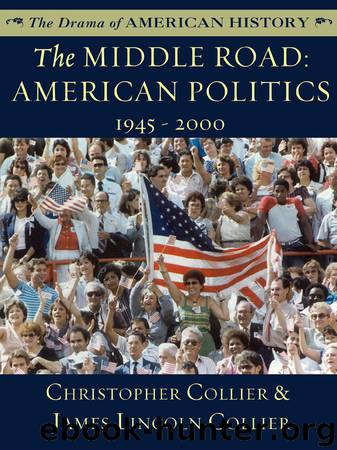The Middle Road: American Politics by Christopher Collier & James Lincoln Collier

Author:Christopher Collier & James Lincoln Collier
Language: eng
Format: epub
Publisher: AudioGO
Published: 2002-11-26T05:00:00+00:00
Police arrest a demonstrator near Democratic party headquarters during the national convention in Chicago in 1968. The demonstrator had climbed on a barricade and waved the flag of the Viet Cong, the rebels fighting the South Vietnamese and their American allies. Arrests of this kind were probably unconstitutional, but Chicago police had been ordered to stop all demonstrations.
Richard Nixon, who had lost the presidential race to Kennedy in 1960 and a race for the governorship of California in 1962, had seemed then to be finished in American politics. However, he was still a well-known figure. He had been quietly going around the country building alliances with important people in the Republican Party, especially among conservatives and "middle roaders." He seemed to offer stability and order and promised "peace with honor" in Vietnam. The Republicans had lost badly with an arch-conservative, Barry Goldwater, in 1964. They wanted somebody from the middle-of-the-road. Nixon got the Republican nomination.
It seemed at first that Nixon would win easily over Humphrey, who was burdened with the legacy of Vietnam. However, in time Humphrey abandoned his support of the war. The nation clearly yearned for order and stability, but there remained a strong liking for many of Johnson's Great Society programs, especially among blacks and the less-well-off who were benefiting from them. Like the elections of 1948 and 1960, this one turned out to be closer than anyone had expected: George Wallace received 13 percent of the votes and won five southern states. Nixon won by only 500,000 votes, a tiny percentage of all cast. But he did win, indicating that Americans wanted a return to stability more than they wanted social reforms. The backlash against the behavior of the student activists had, in the end, pushed many American voters in a more conservative direction.
The 1968 election changed the nature of American politics. The Republican Party had been formed just before the Civil War, mainly to end the spread of slavery. After the war Southerners saw Republicans as their enemy, and they became a "solid South" of Democratic voters. Beginning as early as 1948 as the Democratic Party became the party most associated with civil rights for blacks, southerners began to abandon it. By 1968 the efforts of Democrats like Kennedy and Johnson to end segregation in the South soured many southerners on the Democratic Party. Further, the more conservative Republican Party fit the southern mood. Increasingly thereafter the Southerners began to vote for Republicans or for southern third-party candidates.
At the same time, the Democratic Party was being torn between those who clung to the older liberalism of Roosevelt's New Deal, and those who wanted even more liberal, indeed radical, policies, such as the legalization of marijuana, the end to restrictions on pornographic literature, equal rights for women, and the de-criminalization of homosexual practices. The effects would be seen in the election of 1972.
Download
This site does not store any files on its server. We only index and link to content provided by other sites. Please contact the content providers to delete copyright contents if any and email us, we'll remove relevant links or contents immediately.
The Mayflower and the Pilgrims' New World by Nathaniel Philbrick(4502)
I'm Still Scared by Tomie dePaola(4384)
Bloody Times by James L. Swanson(4371)
Pocahontas by Joseph Bruchac(4259)
Bomb: The Race to Build--And Steal--The World's Most Dangerous Weapon (Newbery Honor Book) by Steve Sheinkin(3960)
Flesh and Blood So Cheap by Albert Marrin(3838)
An American Plague by Jim Murphy(3766)
Little Author in the Big Woods by Yona Zeldis McDonough(3516)
The Giant and How He Humbugged America by Jim Murphy(3446)
Hello, America by Livia Bitton-Jackson(3168)
The President Has Been Shot!": The Assassination of John F. Kennedy by Swanson James L(3101)
Harry Potter: A History of Magic by British Library(3048)
The Landing of the Pilgrims by James Daugherty(2944)
Gettysburg by Iain C. Martin(2834)
The Extraordinary Suzy Wright by Teri Kanefield(2718)
Ben Franklin's Almanac by Candace Fleming(2530)
The Impossible Rescue by Martin W. Sandler(2343)
Bloody Times: The Funeral of Abraham Lincoln and the Manhunt for Jefferson Davis by James L. Swanson(2122)
Who Was Louis Braille? by Margaret Frith(1981)
